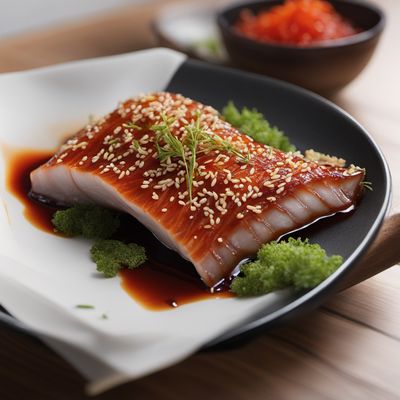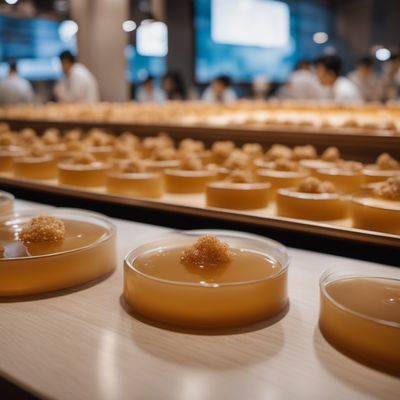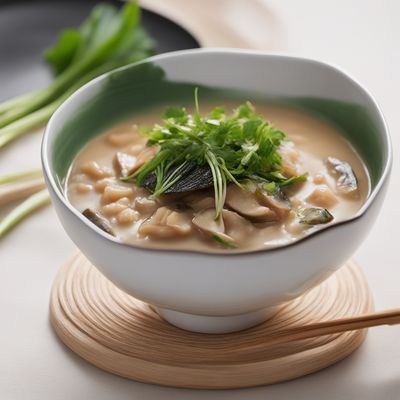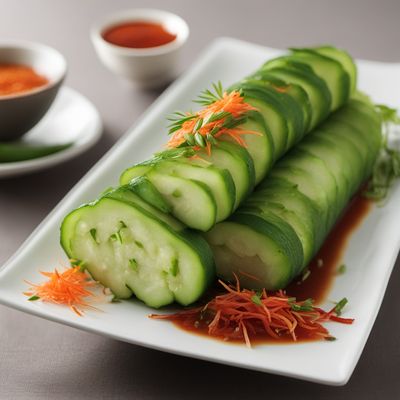
Recipe
Sindhi-style Jeonbokjuk (Abalone Porridge)
Savory Sindhi Delight: Abalone Porridge with a Twist
4.1 out of 5
Indulge in the flavors of Sindhi cuisine with this delightful twist on the classic Korean dish, Jeonbokjuk. This Sindhi-style Jeonbokjuk features tender abalone cooked in a creamy rice porridge, infused with aromatic spices and herbs.
Metadata
Preparation time
30 minutes
Cooking time
45 minutes
Total time
75 minutes
Yields
4 servings
Preparation difficulty
Medium
Suitable for
Gluten-free, Dairy-free, Nut-free, Low-fat, Low-sodium
Allergens
Shellfish (abalone)
Not suitable for
Vegan, Vegetarian, Paleo, Keto, High-protein
Ingredients
In this Sindhi adaptation of Jeonbokjuk, we incorporate the flavors and spices commonly found in Sindhi cuisine. The original Korean dish is typically made with seafood stock and Korean spices, whereas the Sindhi version infuses the porridge with aromatic spices like cumin, coriander, and turmeric, which are commonly used in Sindhi cooking. Additionally, fresh herbs like cilantro and mint are added to enhance the flavors and provide a refreshing twist. We alse have the original recipe for Jeonbokjuk, so you can check it out.
-
1 cup (200g) rice 1 cup (200g) rice
-
4 cups (950ml) water 4 cups (950ml) water
-
4 abalone, cleaned and sliced 4 abalone, cleaned and sliced
-
1 onion, finely chopped 1 onion, finely chopped
-
2 cloves of garlic, minced 2 cloves of garlic, minced
-
1 teaspoon cumin powder 1 teaspoon cumin powder
-
1 teaspoon coriander powder 1 teaspoon coriander powder
-
1/2 teaspoon turmeric powder 1/2 teaspoon turmeric powder
-
Salt to taste Salt to taste
-
Fresh cilantro, chopped (for garnish) Fresh cilantro, chopped (for garnish)
-
Fresh mint leaves, chopped (for garnish) Fresh mint leaves, chopped (for garnish)
Nutrition
- Calories (kcal / KJ): 250 kcal / 1046 KJ
- Fat (total, saturated): 2g, 0.5g
- Carbohydrates (total, sugars): 50g, 1g
- Protein: 10g
- Fiber: 2g
- Salt: 1g
Preparation
-
1.Rinse the rice thoroughly and drain.
-
2.In a large pot, bring the water to a boil.
-
3.Add the rice to the boiling water and reduce the heat to low. Cook the rice, stirring occasionally, until it becomes soft and starts to break down, about 30 minutes.
-
4.In a separate pan, heat some oil and sauté the chopped onion and minced garlic until golden brown.
-
5.Add the sliced abalone to the pan and cook for a few minutes until it turns opaque.
-
6.Add the cumin powder, coriander powder, turmeric powder, and salt to the pan. Stir well to coat the abalone with the spices.
-
7.Transfer the cooked rice to the pan with the abalone and spices. Mix well to combine.
-
8.Continue cooking the porridge on low heat for another 10-15 minutes, stirring occasionally, until it reaches a creamy consistency.
-
9.Adjust the seasoning with salt if needed.
-
10.Serve the Sindhi-style Jeonbokjuk hot, garnished with fresh cilantro and mint leaves.
Treat your ingredients with care...
- Abalone — Make sure to clean the abalone thoroughly before slicing. Remove any dirt or debris from the shell and rinse the abalone under cold water. Use a sharp knife to slice the abalone into thin pieces for even cooking.
Tips & Tricks
- For a richer flavor, you can substitute some of the water with seafood stock.
- If abalone is not available, you can use other seafood such as shrimp or scallops as a substitute.
- Adjust the spices according to your preference. Add more or less cumin, coriander, and turmeric to suit your taste.
- To make the porridge creamier, you can add a splash of coconut milk or cream towards the end of cooking.
- Leftover porridge can be refrigerated and reheated the next day. Add a little water or stock when reheating to adjust the consistency.
Serving advice
Serve the Sindhi-style Jeonbokjuk hot as a main course. It can be enjoyed on its own or with a side of naan bread or roti.
Presentation advice
Garnish the Sindhi-style Jeonbokjuk with a sprinkle of fresh cilantro and mint leaves to add a pop of color. Serve it in individual bowls, allowing the vibrant green herbs to stand out against the creamy porridge.
More recipes...
For Korean cuisine » Browse all

Korean Banchan: A Flavorful Assortment of Side Dishes
Korean Banchan: A Symphony of Flavors to Delight Your Palate

Grilled Fermented Skate (Hongeo) with Spicy Soy Sauce
Fiery Delight: Grilled Fermented Skate with a Spicy Soy Twist

Korean-style Lasagne
Kimchi-infused Lasagne: A Fusion of Italian and Korean Flavors
More Korean cuisine dishes » Browse all

Guljeon
Korean-style Oysters
Guljeon is a traditional Korean seafood pancake that is made with fresh oysters and scallions. This dish is crispy on the outside and soft on the...

Maejakgwa
Maejakgwa is a traditional Korean dessert that is typically enjoyed during the holidays or special occasions. It is known for its crispy texture...

Kongjaban
Soy-Glazed Soybeans
Kongjaban is a Korean dish made with soy sauce-marinated soybean sprouts.




